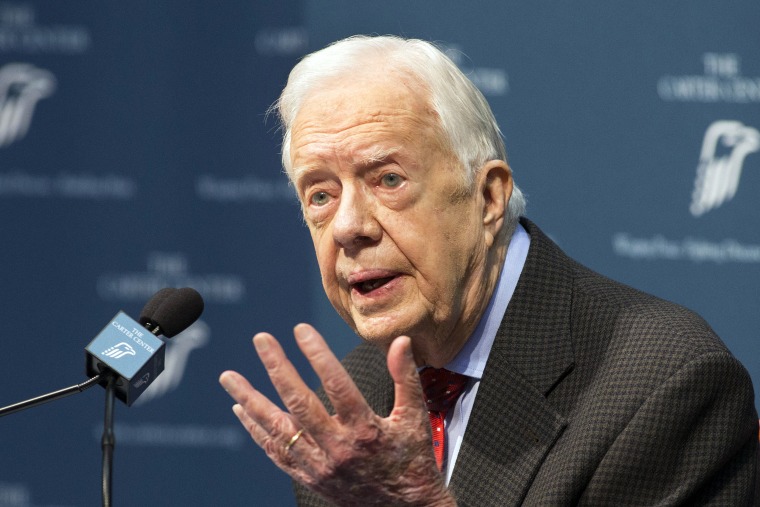Former President Jimmy Carter was known globally for his diplomacy and humanitarian work. The world of medicine will remember him not only as a person who beat the cancer that spread in his body, but also as arguably the most influential voice to raise awareness of a cutting-edge cancer treatment: immunotherapy.
Even people who have never heard that term usually know it was “the Jimmy Carter drug” that helped save his life.
Carter’s successful cancer treatment “would have been considered a miracle just 15 to 20 years ago,” said Dr. Adam Friedman, chair of dermatology at George Washington University. “The ‘Carter effect’ spawned a new era of hope for patients who would ordinarily be hopeless.”
Advances in melanoma
In 2015, a person with metastatic melanoma — a form of skin cancer that has spread throughout the body — was unlikely to survive more than six months, and possibly not even six weeks if he or she happened to be 90 years old.
Carter believed that was his fate when he announced in August of that year that melanoma had spread to his liver and his brain.
“I’ve had a wonderful life,” Carter said at a media briefing at the time. “I feel that it’s in the hands of God and my doctors, and I’ll be prepared for anything that comes.”
There are many possible reasons Carter, who died sunday at age 100, survived as long as he did. He had access to some of the best cancer doctors in the world as he underwent surgery and radiation. He was a man of strong faith and lived with purpose, which he spoke about at the 2015 briefing.
He also revealed that he would be treated with a relatively new immunotherapy called pembrolizumab, sold as Keytruda.
Keytruda works by harnessing the power of the body’s immune system to attack cancer cells.
“This is a medicine that they use for melanoma that enhances the activity of the immune system,” he said at the time.
The Food and Drug Administration approved the first immunotherapy drug, called Yervoy, just four years earlier, in 2011. Keytruda wasn’t greenlighted until 2014. Both were originally intended for the notoriously hard-to-treat melanoma.
Before that, there hadn’t been any new approaches for melanoma in decades, said Dr. Amod sarnaik, a professor of cutaneous oncology and immunology at Moffitt Cancer Center’s Cutaneous Oncology Program in Tampa, Florida.
“It was a rather depressing time,” he said.
Carter’s willingness to speak openly about the new approach, sarnaik said, prompted excitement and investment in the field.
“In the absence of this unfortunate thing happening to President Carter, I don’t think that we would be talking about immunotherapy in the national domain,” he said.

since Carter’s diagnosis, at least 15 new treatments for stage 4 melanoma have been approved, said Dr. Michael Davies, chair of the department of melanoma and medical oncology at MD Anderson Cancer Center in Houston. some immune therapies are used in combination with other cancer drugs or even surgery at earlier stages of disease.
And its use has expanded greatly. Varying forms of immunotherapy are used to treat a wide variety of cancers, including lung cancer, breast cancer, endometrial cancer, head and neck cancer and some rare forms of colon cancer.
studies of its possible use in treating pancreatic cancer are also underway, said Dr. suresh Ramalingam, executive director of the Winship Cancer Institute of Emory University, where Carter was treated. Ramalingam wasn’t directly involved in Carter’s care.
“Immunotherapy has been a game changer,” Ramalingam said. “We are seeing patients live longer and live better because of what immunotherapy has meant to the field of cancer.”
In early June, researchers at NYU Langone Health reported that patients with metastatic melanoma given a combination of pembrolizumab (Keytruda) and an experimental mRNA vaccine targeting their cancer cells were living longer without additional spread of their disease compared to people who got Keytruda alone.
Three-quarters of patients who got both therapies had no recurrence three years later, compared to 56% in the Keytruda-only group. The combination group had an edge in survival, too: 96% versus 90%.
Immunotherapy doesn’t work for everyone, offering only about a 30% to 60% success rate, depending on the cancer and the course of treatment.
“We’re not satisfied with that,” sarnaik said. “We want a 90% to 100% response rate, and we’re nowhere near those numbers.”
There can be side effects. Immunotherapy can kick the immune system into overdrive, causing a variety of inflammatory responses. People who develop lung inflammation may need supplemental oxygen. such a complication in the colon, called colitis, can be life-threatening, Davies said.
still, it doesn’t usually come with hair loss, nausea, extreme fatigue and other side effects historically associated with chemotherapy.
“Many of my patients on immunotherapy continue in their jobs. They get the treatment in the morning and go to work in the afternoon,” Ramalingam said.
Colleagues who treated Carter were “immensely grateful” for his contribution in raising awareness of immunotherapy, Ramalingam said.
“When we see patients like President Carter beat their cancer, that is the positive reinforcement that drives us to do even better,” Ramalingam said.
